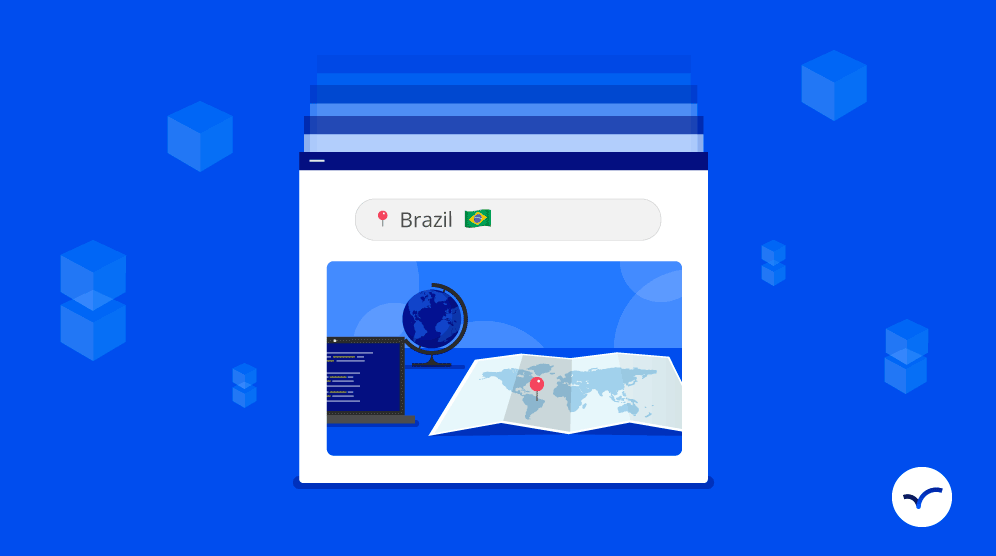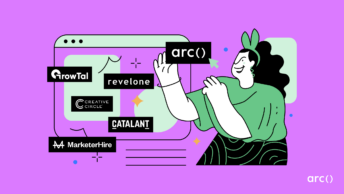If you’ve always wanted to learn Portuguese and are looking to offshore your company — you might consider Brazil, the largest country in South America and eighth largest economy in the world. Brazil is home to one of the largest consumer markets in Latin America.
Brazil boasts the most talked about venture capital market in South America — its total absorption of venture capital soared to $1.3 billion in 2018, which was nearly two-thirds of all funds raised in Latin America that year. Whether you’re an already established company or a startup, being in close proximity to new energy and markets is bound to bring inspiration.
If you’d like to know more about the tech scene in Brazil, read on to see how it could potentially be your next tech hub location and/or a great place to hire remote developers.
A quick note before we start: this post is designed to give you a snapshot of Brazil’s suitability as an engineering hub location, but should not be relied upon instead of seeking professional advice specific to your situation.
Looking for top talent fast? See how Arc can help you:
⚡️ Find developers, designers, marketers, and more
⚡️ Freelance or full-time remote + fully vetted
⚡️ Save up to 80% with global hires
Hire top talent with Arc risk-free →
Availability of STEM Talent
While the number of Brazilian STEM graduates in Brazil is much lower compared to Mexico, as of 2018, seventeen percent of college students in Brazil graduate with a STEM degree — roughly 24,000 per year.
There are many prestigious programs for computer science in Brazil, including programs at: the University of Campinas, the Pontifical Catholic University of Campinas, the University of São Paulo, and the Federal University of Minas Gerais, the Federal University of Pernambuco, the Federal University of Santa Catarina, the Federal University of Rio de Janeiro, and the Federal University of Rio Grande do Sul.
Developer Talent Pool
In 2018, there were 475,272 developers from Brazil who answered Stack Overflow’s survey — the highest in Latin America and more than double the number of developers from Mexico. In a HackerRank challenge, Brazil ranked 38th, one ahead of Argentina.
Brazil has one of the largest developer talent pools, ranking 9th place in the world for software and services. In addition, in a TopCoder unofficial ranking, Brazil scored 13th, two places above Argentina. Finally, in terms of number of GitHub accounts, Brazil ranks sixth, behind only the United States, China, India, the UK, and Germany.
Read More: US vs International Developers: Do Overseas Developers Get a Bad Rap?
Existing Engineering Teams and Tech Hubs in Brazil
Aceco TI
In an article by Data Center Dynamics the marketing director of Aceco TI, Fernando Almeida Prado, explains why they chose Campinas, Brazil:
Aceco TI lists more factors, including land price, availability of electricity, water and skilled labor. Investment has migrated to Campinas for these reasons, but mainly for the quality of the local workforce, since the city has a high degree of development with targeted schools for IT and telecommunications.
Nubank
For David Velez, previously at Sequoia and now CEO of Nubank valued at $10 billion, Brazil is exciting because:
While the economy still hasn’t met its potential, the sheer size of the market is something to consider. There is such a high number of legacy companies across all sectors that haven’t yet evolved with technology. This provides great opportunities for entrepreneurs that want to help reinvent entire industries with their technology.
Other Tech Hubs in Brazil
- Spotify
- Airbnb
- Netflix
- ADP
Time Zone Overlap: Brazil vs United States Time Zones
Brazil has four time zones, spanning from UTC-2 to UTC-5. Brazil’s largest cities, São Paulo, Rio de Janeiro, and its capital, Brasília, all follow UTC-3.
As such, the major cities in Brazil are one hour ahead of New York, Boston, and Miami, two hours ahead of Chicago, and four hours ahead of Los Angeles, San Francisco, and Seattle. Furthermore, Brazil abolished daylight savings time in 2019.
So, if you’re thinking about building an engineering team in Brazil and your company is in the US or Canada, working across time zones won’t be an issue!
Read More: What a Freelance Developer Contract Should Include (w/ Templates)
English Proficiency in Brazil
According to EF’s English Proficiency Index in 2019, Brazilians scored 50.93 out of 100 points — putting them sixth in Latin America. In addition, in 2014, the Brazilian Ministry of Education created the Languages Without Borders program to boost foreign language skills among Brazilian graduates, including programs in English, French, and German.
Lifestyle in Brazil
With a score of 34.3, Brazil ranks 23rd of all countries analyzed in the Happy Planet Index. For context, the United States ranked 108th out of 140, Mexico 2nd, and Argentina 19th.
Cost of Living in Brazil
The cost of living is generally affordable by U.S. and Canadian standards but higher than Latin American averages. The costs below are in U.S. dollars.
A one-bedroom apartment in the center of Rio de Janeiro will set you back $315 a month. In São Paulo, the largest city in Brazil, a similar apartment would be $380 per month, and in Campinas, a major tech hub within São Paulo, an equivalent apartment in the city center rents for only $207 per month.
Read More: 4 Misconceptions About Hiring Remote Developers & What To Do About Them
You can also try Arc, your shortcut to the world’s best remote talent:
⚡️ Access 450,000 top developers, designers, and marketers
⚡️ Vetted and ready to interview
⚡️ Freelance or full-time
Try Arc and hire top talent now →
Remote Developer Salaries in Brazil
While the cost of living is high in Brazil relative to its neighbors, the cost of hiring a local developer still represents significant savings when compared to the United States or Canada.
Below are average annual desired salaries in U.S. dollars for remote developers in Brazil:
- Front-end Developer: $69,132
- Back-end Developer: $72,591
- Mobile App Developer: $72,046
- DevOps Engineer: $75,164
Why Brazil is a Great Location for an Engineering Team or Hub
Brazil might be a great choice for an engineering hub for you because of its low(er) cost of living, reasonable prices for skilled talent, and its large market — an Internet Trends 2019 report ranks Brazil’s population as the fifth largest group of internet consumers in the world.
In addition, according to an AI Index report from Stanford University, during the last four years Brazil has shifted into high gear as one of the top five countries in the world with the fastest growth in AI hiring.
As the world looks toward South America for investment and growth, Brazil, the largest country in the region, might be worth considering.
Read More: On-Site vs Remote vs Distributed Engineering Teams: How to Choose?
All About Employment in Brazil
Employee Benefits
Brazilian employees are entitled to:
- Access to severance funds of monthly deposits of 8% of their gross compensation
- 44 hour maximum work week
- Annual paid vacation (30 days off after 12 months of work)
- A 13th month mandatory Christmas bonus of one month’s salary
- Health care and day care assistance
- Minimum essential ration (depending on employment type) — box or basket containing rice, beans, sugar, salt, coffee, pasta, oil, flour, and sardines
- Transportation to and from work as well as one meal at work
Statutory Labor Requirements
Employees in Brazil are classified as employees, independent contractors, interns, or apprentices. Employees have statutory rights not given to independent contractors. Independent contractors’ rights are usually negotiated between employer and contractor and Article 442 of the Consolidation of Labor Laws sets how self-employed workers are treated.
The minimum wage, as of May 2020, is equivalent to USD $186.83 per month, paid out over 13 months. The federal government adjusts the Brazilian minimum wage annually. In addition, while each Brazilian state has its own minimum wage, it cannot be lower than the federal minimum wage.
National Holidays
There are 12 paid national holidays every year, including New Year’s Day, Carnival, Good Friday, Labor Day, Independence Day, All Soul’s Day, Republic Day, and Christmas Day.
Read More: Is Your Developer Ready for Remote Work? 14 Key Interview Questions
Government incentives
Tax incentives
Under the Information Technology Law, hardware and automation companies that invest in Research and Development can apply to reduce their excise taxes until 2029. Software companies are ineligible for the reduction because they are not charged excise taxes to begin with.
The excise tax reduction benefit ranges from 70 percent of excise tax reduction for industrial plants located in the south and southeast to 85 percent excise tax reductions for the north, northeast, and midwest regions.
Ease of Obtaining Visas
To work in Brazil, your senior staff member needs a work visa. Your company must request this from an office of the General Coordination of Immigration of the Ministry of Labour and Employment (MTE).
To get a visa for senior staff members, the government will require a certain amount of foreign investment per foreign worker as well as job opportunities created for Brazilian citizens. Non-senior employees only require temporary visas, which are valid for up to two years, extendable once or convertible into a permanent visa.
The employer must submit the employment contract to the MTE and provide evidence that the employee has sufficient qualifications and experience. The temporary visa renewal must be made at least 90 days before its expiration date and the conversion to a permanent visa must be made at least 30 days before the expiration date.
The MTE usually takes from 30 to 45 days to process the visa.
After the granting of the residence permit, the foreign national must, within 30 days from the date of publication of the permit, request registration with the National Migration Register. Failure to do so will result in a penalty for each day of delay.
Read More: Mexico: All You Need To Know To Build An Engineering Team Here
Ease of Relocating Senior Staff
While there are no other restrictions in Brazil about who can occupy management or board positions, at least two-thirds of a Brazilian company’s employees must be Brazilian, which includes managers and directors.
Exceptions to this, however, is if the person in question was convicted of a crime against the popular economy, against the national financial system, against antitrust rules, or against consumer relations, public faith, or property.
There are different visa levels depending on the employee’s level in the company, but senior staff members who are directors, managers, or administrators will need a permanent visa. This visa is usually granted for the same number of years the foreign national is appointed as an officer of the company, but it can be easily extended after a new appointment. If the foreign national is appointed for an indefinite period of time, the visa will be initially valid for five years.
To receive this visa, the Brazilian company must receive foreign investment equivalent to BRL600,000 or BRL150,000 (USD $102,000 or USD $25,000) per foreign worker. If the company receives BRL150,000 (USD $25,000) per foreign worker, it must also create at least ten new job positions for Brazilian citizens within two years of the arrival of the foreign national as a permanent visa holder.
Read More: Argentina: All You Need to Know to Build an Engineering Team Here
Looking for top talent fast? See how Arc can help you:
⚡️ Find developers, designers, marketers, and more
⚡️ Freelance or full-time remote + fully vetted
⚡️ Save up to 80% with global hires
Hire top talent with Arc risk-free →
Regulatory environment
Legal System
Brazil’s labor laws apply to all those who work in Brazil, regardless of nationality. If a Brazilian national is hired to work abroad in a foreign county, his or her employment contract is governed by the rules of the country where they provide the service.
However, if Brazilian labor law is more favorable to the employee, it will apply if the Brazilian citizen or foreign national is hired in Brazil to work abroad, the employment contract was already executed in Brazil before the transfer occurred, or if the employee maintains an employment contract with a Brazilian company or its subsidiary.
Ability to “Do Business”
Brazil has incredibly high payroll taxes as well as social benefits costs for employers. All in all, employers are charged at least 68.18 percent on each employee’s payroll taxes.
With a worker’s annual vacation leave, their vacation leave bonus payment, a 13-month salary, payment into a severance pay fund of 8 percent of gross compensation, a severance pay fund termination compensation fee, and payroll taxes, on average, an employee in Brazil costs an extra 73% on top of his or her salary.
In addition, these are the minimum benefits an employee expects — to attract a highly qualified employee, you’ll want to offer even more benefits. However, you’ll want to keep in mind that while payroll costs and employee benefits may be more expensive than in the United States and Canada, Brazilian salaries are much lower, which can balance out the higher payroll contributions.
Read More: Ukraine, Poland, Estonia, Romania: Where to Build Your Engineering Team
Making Payments as a Multinational Enterprise
All payroll transactions must be done in the Brazilian real. Setting up your Brazilian bank account is the second most important step you’ll need to take after incorporating your company. It is compulsory for a company that does business in Brazil to have a Brazilian bank account where the legal administrator is the master signatory.
In order to open a corporate bank account, your company must provide the bank with your CNPJ, an ID number (similar to an EIN) as well as a copy of your company’s social contract. Each Brazilian bank has its own requirements for corporate bank accounts, but in general, you’ll need the copies of passports and driver’s licenses for all of the company directors, the company’s certificate of incorporation, a copy of the memorandum and articles of association, and the directors’ or trustees’ resolutions.
However, one requirement across the board is that funds originating from a foreign bank account held in the investor’s name must be wired and the transfer registered with the Brazilian Central Bank. You may need to use a money exchange agency to do this, and they will require a set of documents to create an account with the Brazilian Central Bank on your behalf.
After your transfer is registered with the Brazilian Central Bank and your ID number is issued, you need to have a currency exchange contract drawn up and executed by a legal entity in order to exchange your funds into reais. Once you open your bank account, you will be on your way to paying your local employees.
Read More: Canada, Mexico, and Argentina: Where to Build Your Engineering Hub
Why Hire Remote Developers from Brazil
Methods of payment
Cross-border payment options
You can pay remote developers from Brazil using Xoom, TransferWise, international wire transfer, Payoneer, and PayPal.
Preferred currencies
Brazil’s official currency is the real, so developers will need to be paid in Brazilian reais.
The Legal Side of Hiring a Remote Developer from Brazil
Unlike Mexico and Argentina, while Brazil has stringent rights for employees, if you hire a remote developer as an independent contractor, you’ll adhere to Article 442 of the Consolidation of Labor Laws rather than the Brazilian Labor Code when it comes to employee rights.
This means that if you hire a remote developer from Brazil, you don’t bear the same costs you do in Mexico and Argentina. Put simply, instead of it being your responsibility to pay their social security contributions, the onus is on the remote developer to do so.
According to the Civil Code, either party can terminate the independent contractor agreement by giving a minimum notice of: one day if the contract is for less than seven days, four days if the contractor is paid weekly, and eight days if the contractor is paid monthly.
Read More: Freelance Payment Terms: Fixed Cost vs Hourly vs Retainer Payments
Cultural Expectations
Employer-Employee Relations
Compared to American work culture, Brazilian work culture is more hierarchical, which may mean that your developer may not feel comfortable sharing conflicting opinions with you right off the bat if they’re not used to questioning someone higher up in the pecking order. You may want to make it clear that you’d like honest feedback if they notice something wrong.
In addition, working in groups for Brazilians means collaboration from beginning to end and checking constantly with group members, making sure to solve problems together before moving on. Whether this is a blessing or a curse depends on your own company culture and SOP, but a discussion about how you see collaboration within the project may be beneficial for your relationship with your developer.
In most Brazilian cities, working hours are 8:30 AM to 5.00 PM with an hour or two in the middle for lunch. Brazilians are also quite flexible when it comes to time — in other words, tardiness is culturally acceptable, which you may or may not appreciate yourself. When scheduling meetings with your developer, you can emphasize that whatever time you set is “with British punctuality,” (hora inglesa) which implies that you’d actually like for the meeting to begin on time.
Holidays
Brazilian developers hired as full-time employees will expect at least 12 paid national days off per year. If you hire your developer as an independent contractor, you’ll need to negotiate holidays and holiday pay separately.
Benefits
If you hire a remote developer as a full-time employee, you’ll want to adhere to Brazilian standard labor benefits, which include a 13 month-bonus, maximum workweek, health care and daycare assistance, and provision of minimum essential rations. While you may certainly offer additional perks to attract the best developers, you’ll want to meet these benefits at the very least.
If you hire a remote developer as an independent contractor, the terms and conditions of the contract will be set by the two of you.
Because independent contractor labor falls under the Brazilian Civil Code, which has different expectations for independent contractors than employees under the Brazilian Labor Code, there aren’t as many protections for independent contractors.
That being said, because Brazilian developers are used to a minimum level of benefits, you should still make them a competitive offer in line with Brazilian standards.
Read More: Toronto vs Vancouver: Where to Build Your Next Remote Engineering Team
Is Brazil Your Ideal Engineering Team or Engineering Hub Location?
If you’re looking to establish a tech hub, and are weighing up country options, Brazil could potentially be a good fit. Brazil has a large supply of high-quality STEM talent and a convenient time zone that overlaps with the United States, particularly when it comes to Eastern and Central time zones.
Although you pay a significant amount in social security benefits in Brazil, local salaries are lower than in the United States and Canada. In addition, Brazil is more flexible than Mexico and Argentina when it comes to independent contractors and their labor benefits, which could benefit you when it comes to hiring local employees as well as remote developers.
If you’re looking to hire a remote developer from Brazil, you’ll have a lot of very qualified STEM graduates to choose from. While Brazilian employees are offered great social benefits, independent contractors are not subject to the same legislation, which could help you cut costs.
While you still want to offer perks that are close to the minimum benefits in Brazil to attract the best talent, if you hire a Brazilian remote developer, you’ll pay fewer direct costs compared to hiring a remote developer from Argentina because of the differences in labor law. Thus, while both countries offer great remote developers, there’s more leeway in terms of compensation when hiring a remote developer from Brazil.
If you’re considering building your tech hub in Brazil or hiring Brazilian remote developers and have questions, feel free to reach out to us. Remember that you will need to seek professional advice specific to your situation if you seek to do business in another country.
You can also try Arc, your shortcut to the world’s best remote talent:
⚡️ Access 450,000 top developers, designers, and marketers
⚡️ Vetted and ready to interview
⚡️ Freelance or full-time








